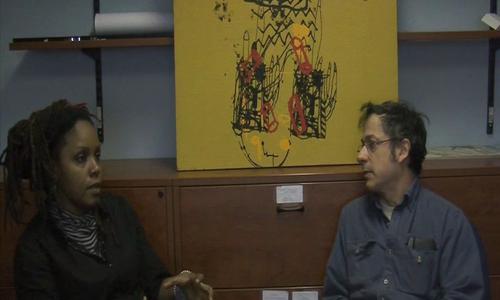March 2012: Matana Roberts

Matana Roberts is a Chicago-born, New York-based alto saxophonist, improviser, composer, and sound conceptualist. Her discography includes The Chicago Project (with guitarist Jeff Parker, bassist Josh Abrams, and drummer Frank Rosaly, featuring several saxophone duos with Fred Anderson), Live in London (with pianist Robert Mitchell, bassist Tom Mason and drummer Chris Vatalaro), and the sweeping ensemble, Coin Coin Chapter One: Gens de Couleur Libres. This recent work focuses on place, the problem of memory, and tradition as recognized, deciphered, deconstructed, and interrogated through radical modes of sound communication. A lot of the Coin Coin scores are graphically notated, with a mixture of Western notation and graphic notation, and the finished product is a bluesy combination of vocal narration--a sort of channeling of personal ancestry--within an instrumental soundscape. In live performances visual images are projected. Matana Roberts says: “Coin Coin is a compositional sound language, that I have been developing since 2006. My initial interest in creating this work came from my childhood fascination with ghosts, spirits, spooks, and the faint traces of what they leave behind.....The musical root of much of this work also stems from my continued attraction/repulsion to certain aspects of the American Jazz tradition(s) which I am deeply involved with as an alto saxophonist.” Roberts can also be heard on two CDs by her collaborative trio, Sticks and Stones, with Abrams and Chad Taylor, and several records by Greg Tate’s improvising ensemble Burnt Sugar.
Listen to Matana's frank and revealing discussion with ICASP researcher Eric Lewis, as they cover the place of history and memory in musical creation, the relationship between Roberts and the improvising musicians who play in her piece, differing audience responses to performances, and much more.
“Panoramic sound quilting”: On Coin Coin and Compositional Methods can be viewed - and a full transcript is available - in our Research Collection.


